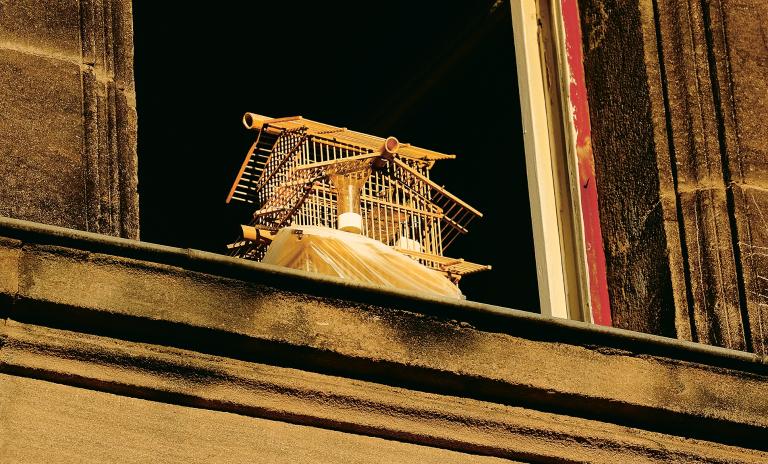Pace for impact
![{[downloads[language].preview]}](https://www.rolandberger.com/publications/publication_image/ta43_en_cover_j_download_preview.jpg)
In the new edition of Think:Act Magazine we explore the benefits of a calmer pace of life and business, and learn from the success of slow companies.


by Natasha D’Souza
Photos by Julia Sellmann
Once dreaded as a career killer, a growing number of executives are opting for an extended break, only to come back restored and reinvigorated for better and sometimes bigger roles. But stepping off the treadmill requires some soul-searching and strategic planning to yield the desired results.

Daisy Auger-Domínguez found herself involuntarily pressing pause on her career. In 2018, she was the senior vice president of talent acquisition at Viacom and overseeing a restructuring exercise at the company – during the course of which she realized her role was being eliminated. "As an immigrant, I had never not worked, and so much of my identity was wrapped up in the fact that I'd worked for these tremendous global brands like Disney, Google, Moody's," she recalls. "At 44, this was my first time not having a job, and while it initially unnerved me, I also realized I had the luxury of a financial safety net by exercising the remaining 11 months of my executive contract."
Instead of immediately looking for her next role, Auger-Domínguez decided to take a break and "think more expansively about what I could be doing in my career." The decision turned out to be a game-changing turning point for the people and culture leader. She secured a book deal during her career break and went on to write her first book, Inclusion Revolution: The Essential Guide to Dismantling Racial Inequity in the Workplace. Most recently, she was global chief people officer at Vice Media before embarking on her second career break in August 2023.
"People are evaluating their lives and their work through a significantly different lens."
Once seen as a major setback in an executive's trajectory, a career pause is increasingly considered a power move as more senior leaders strategically step off the treadmill amidst a wider post-pandemic societal rethink on a number of topics, including ambition, impact and purpose in one's career. "Post-Covid, people are evaluating their lives and their work through a significantly different lens," explains Catherine Rymsha, author and lecturer in managerial leadership at the University of Massachusetts Lowell. "The Great Resignation reflected a shift by professionals choosing to take more control of their career choices and trajectories. Even executives, especially those skewing closer to Gen X, now think of a career as a squiggly line as opposed to a defined, sequential progression within one company or industry that plays out over decades," says Rymsha.
Tankut Sensurucu, partner at Egon Zehnder, a global leadership advisory firm, agrees. "There is an evident shift in the last 10 years when it comes to executive openness to taking a career break or a sabbatical. Younger generations exhibit a dramatically different approach to work-life balance and career development, and these considerations are permeating the executive ranks."
According to Sensurucu, a sabbatical today is "the equivalent of a holiday 30 years ago, when there were no smartphones and it was a true vacation." He goes on to add that it is a lot more challenging to be an executive today, because many people in these types of leadership positions are so overwhelmed with external input that they often don't have the necessary quiet time to disconnect and reflect. "When you consider that professional athletes who are trained for peak performance at game time have distinct periods for rest and recovery in their calendar, shouldn't our executives, the equivalent of a corporate athlete, have that opportunity too?" he wonders.

53%: The percentage of people who felt that a break made them better at their job after they restarted their careers – which 51% of hiring managers in the same survey believed was possible at any time.
Source: LinkedIn
Sensurucu notes that most executives who are interested in a sabbatical are typically those who have already successfully achieved certain key career milestones and established credibility in their company and industry. They have also often met their financial goals or a certain socio-economic status and are now keen to pursue self-actualization and to explore new ways to grow and develop. Coming from this standpoint, the decision to take a step back from the professional stage can be driven by many reasons, including family responsibilities, health (physical or mental), skills development, travel, volunteer work or pursuing a passion project.
Take James Raybould, who chose to press pause after a 12-year tenure at LinkedIn – a company he had joined pre-IPO and in which he'd risen to the ranks to lead 100+ person teams in a principal product leadership role. His year-long pause, says Raybould, was triggered by a number of factors – the loss of a close friend a few years earlier, feeling his learning curve flattening at LinkedIn, realizing his children were at an age when he could still meaningfully spend time with them, while also acknowledging that he could financially ride out a year without income. Raybould used his career break to primarily spend time with his young children and train as a cold-water marathon swimmer, a deep-seated passion since his teenage years, and take on a few fractional executive roles. "I designed my time away to allow for plenty of new stimuli and realized how much I enjoyed having this level of flexibility and intellectual variety. After my career break, I knew going back to full-time professional monogamy was not for me," shares Raybould, who now works as a fractional executive for two artificial intelligence startups alongside a yet undisclosed initiative with LinkedIn and other projects.
Former Googler and author of Pause: Harnessing the Life-Changing Power of Giving Yourself a Break, Rachael O'Meara, says she sought a paid leave of absence from the company so that she could rebuild her confidence, reconnect with her career purpose and rethink the kind of corporate leadership role that would suit her best. After her three-month break, she returned to Google where she continued to work for over a decade. She contends that a career pause should be normalized in the workplace in much the same way sabbaticals are in academia. "A sabbatical is practically mandatory for tenured professors. Why shouldn't that be the case in other industries?" asks O'Meara.
"You don’t know what you might discover."
Life-changing events such as the loss of a loved one or even a near-death experience also create an inflection point. Sensurucu was 35 and rising up the ranks at Coca-Cola when he lost his father. "It suddenly shifted my perspective on life, career, the world to the point where I couldn't be fully present in my role," he recalls. Sensurucu created a flexible work schedule for almost two years before moving to Egon Zehnder.
The inherent power of a pause is becoming more apparent in recent years as executives from a cross-section of age groups, typically 40 and above, model the many ways to embrace one (or more) purposeful career breaks while still building a solid career trajectory. Auger-Domínguez credits her first pause with allowing her to be more generative in the way she creates value from her expertise – by giving her the space and impetus to go launch her consulting practice, writing and speaking. "Much like younger generations, we are now going to see more executives weaving in and out of independent work, fractional work and salaried full-time roles," she says.

Ex-Googler O'Meara cautions that many executives get caught in the pause paradox, knowing it can be beneficial for them, but fearing backlash or being stigmatized for taking a break on their C-suite trajectory. Conventional norms around excellence and performance, it seems, still end up crippling top performers from taking a beneficial career break. Sensurucu adds that it takes courage, too: "My observation is that executives don't just fear being labeled as 'not good enough,' there's also fear of the unknown. You don't know where that experience might take you and what you might discover about yourself along the way."
Pausing at the peak of your career or after a significant achievement might be perceived as losing interest in your career or momentum, notes Auger-Domínguez, stressing that this is why being intentional and strategic in designing a pause is crucial. "Everyone else will have an opinion on why someone else is taking a career break. But as long as you have meaningful outcomes from your pause and can clearly frame what led you to take a break at that point in time, the right folks will understand."
46%: The percentage of hiring managers who believe candidates who have taken career breaks undersell the skills – and especially valuable soft skills – they gained during their time away.
Source: LinkedIn
The potential negative perception from a pause appears greater with women, a group that is already more prone to career interruptions since maternity leave remains the most common form of taking a break. A 2022 global LinkedIn survey showed that as many as 64% of women have experienced a hiatus throughout their career journey. Thus, breaks can have a major impact on women's careers, leadership and economic stability. Auger-Domínguez also wants to highlight how societal expectations and conditioning impact each of the genders differently. "When women take a career break, for the same reasons as a man, there are still societal norms which saddle women with the lion's share of the household and caregiving responsibility. So, although she's taken a pause, she doesn't have the same opportunity for self-exploration or professional recalibration as a man might, which ultimately impacts women's overall career trajectories."
Regardless of gender, hitting pause affords benefits that go beyond the professional. "I think we are arriving at the tipping point of understanding that a career break isn't just beneficial to career longevity but to human longevity as well," says O'Meara. She alludes to the stress that comes with a demanding executive career and it contributing to a number of diseases and chronic conditions. "If we are not able to reset our course, we are not going to be the best leaders we can be."

![{[downloads[language].preview]}](https://www.rolandberger.com/publications/publication_image/ta43_en_cover_j_download_preview.jpg)
In the new edition of Think:Act Magazine we explore the benefits of a calmer pace of life and business, and learn from the success of slow companies.
